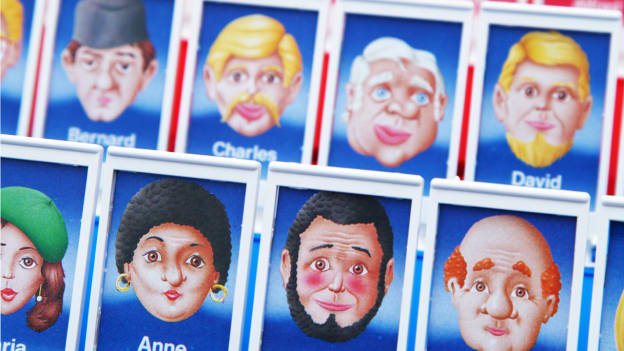You can’t be what you can’t see: Women, inspiration and the necessity of representation

Serena Williams, Indra Nooyi, Kiran Mazumdar-Shaw, Tan Hooi Ling, Angela Merkel, J.K.Rowling, Geena Davis... the list of inspirational women goes on and on.
And yet, during a recent game of Guess Who?, our young daughter insisted she didn't want to be a woman character in the game. In fact, there simply weren't as many women on the board, so if you have played the game it really means if you are a woman character you will lose that round for sure. This led me to two questions: how these small but deeply rooted realities are shaping her perception and what could I do to help change it?
There is no doubt we’ve come a long way in the quest for equality between genders. A combination of policy reform, rising diversity and inclusion awareness, and a steady stream of successful, trailblazing female leaders across all sectors have led to a rapid improvement in how women are perceived in business and beyond.
However, there still are invisible anchors holding us back. According to the WEF, at current rates, it’ll take us over 100 years to achieve complete gender parity. Only 22 percent of the world’s AI professionals are female. Women in leadership metrics across the world are still far from balanced according to the Women Board Directors of Asia report by Corporate Women Directors International: Asia at 12.8 percent, Western Europe at 23.6 percent and US/Canada at 20.9 percent of women in leadership positions.
And at a simpler level, if something as innocent as a game of “Guess Who?” is impacted by perceptions of gender, what are the further-reaching implications as we move towards a (hopefully) fairer future?
As women, how can we unhook our lives from the anchors of self-doubt and pursue success freely, equally, unrestrained by our own limitations? And for men - what active role we need to play to make the shift? We can start with the books we read, the movies we watch, the goals we pursue and the people we place in the public eye.
In the 2018 documentary, “This Changes Everything,” actress Geena Davis and director Tom Donohue delivered some shocking statistics regarding women in Hollywood: in almost 100 years, only one woman has won an Oscar for Best Director. Of the top 100 grossing films of 2017, male-lead characters received double the screen time as female leads and in 2018, 92 percent of the directors of the top 250 domestic films were men. And yet, in 2017, female-led films generated 38 percent more money at the Box Office than male-led films, according to Donohue. The numbers simply don’t add up.
Yes, it’s hard to believe this is still happening in the modern age. But why is it so important? It’s because representation has real-life impacts. In a PBS interview, Davis cites the CSI effect, in which “there were so many shows — so many female forensic scientists on TV that women are now dominating that field because we just saw it on TV.”
And it starts very young. Davis notes that when the children’s movies “Brave” and “The Hunger Games” (both of which feature female archers) came out in 2012, suddenly the percentage of girls taking up archery shot up by 105 percent, higher than adult men.
In an interview with Davis and Donohue, NPR journalist Michel Martin quotes the great novelist and poet Maya Angelou: “You can’t be what you can’t see.” In order to make positive changes - in media as well as in business - young women need someone to look up to.
'There is no difference between boys and girls'
Where do these role models appear from? When it comes to the question of representation, we can look to everything in our culture – from books and TV shows and movies to commercials and advertisements.
There has been a recent spate of excellent commercials and public service announcements that utilize children to demonstrate how notions of equality are both innate and prone to form at a very young age.
The first, linked here, comes from a Norwegian trade union Finansforbundet's campaign. The video shows young children filling two glass jars with blue and pink balls and being rewarded with candy for their work. However, the boys receive significantly more candy than the girls.
“There is no difference between boys and girls!” They cry, “It’s just wrong.” The boys then fill the girls’ jars with sweets to make it equal. The outrage expressed - by both the boys and girls sends a clear message: “unequal pay is unacceptable in the eyes of children”.
The video ends with a startling statistic: in the finance sector, women earn 20 percent less than men on average. Clearly, there is still much work to be done.
A more optimistic message comes from a recent Mercedes-Benz commercial. Designed to “remind girls they have no limits,” the video shows very young girls choosing from a selection of toys - much like our young daughter, playing Guess Who?. At first, they’re reluctant to pick model cars because “they are boys’ toys.” Their self-perception is already shaped: women cannot win races - cannot even drive race cars.
This all changes when the girls are shown a video of Ewy Rosqvist, the first woman to complete the Grand Prix of Argentina. “They told me I couldn’t finish,” she says in the tape. “So I finished first.”
After the sight of this trailblazing woman athlete, the little girls look up, smiling, happy and proud to choose the toy cars.
“What if these associations could be reshaped?” We are asked at the end of the commercial. Going forward, this is what I want to focus on: how are self-perceptions ingrained, and how can we use representation to fight them?
'Someone has to do it'
Issues of sport, gender, and representation intersect again in the recent documentary “Maiden”. Released last year, the film tells the story of the first all-female sailing crew to complete the Whitbread Round the World Race. Largely mocked at the time, the crew were told “you're not strong enough, you're not skilled enough. You're all going to die.” In 1989, the all-women crew went on to win two out of six legs of the grueling 9-month, 33,000 mile race.
I found this tale inspiring not only because of the team’s immense achievement, but the formative experiences that led skipper Tracy Edwards to first pursue this endeavor. Early in the documentary, when asked about the possibility of an all-women crew completing the voyage, Edwards addresses their many detractors: “There's going to be arguments,” she says. “Men are going to say we can't do it, and women are going to say they can do it until time ends. Someone has to do it to prove (it) either way.”
Again, the message here is clear: the simplest way to prove a point is to stop arguing and start doing.
This highlights the importance of representation when it comes to gender equality. There will always be detractors. There comes a point where conversation no longer works: the only thing left is to prove your doubters wrong.
Ultimately, I took two things away from the conversation with our young daughter: how young these ideas of her gender are formed, and the importance of wider representation to unpick them.
Gender inequality won’t disappear overnight. There are obstacles to cross, but we can’t forget the huge progress we’ve already made - and continue to make year on year. There is hope: negative associations with gender are not innate, but they start early and are extremely difficult to undo once they are anchored in our minds.
One thing is for certain: representation matters. As leaders, the more we can do to provide positive role models the better, whether that be through action, policy change or even small shifts in how we perceive our place in the world. Progress cannot happen without self-belief. We need to see examples of trailblazing women represented in order to be the positive change in the world.

















